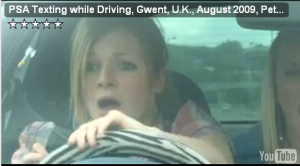Don’t watch this video unless you can handle some “shockvertising.”
It’s been nearly a year since this public service announcement was funded by the Gwent Police Department in the UK. Its blood, screaming, crying, and severe injuries are very disturbing.
This “Don’t text and drive” message went viral on the Internet in August 2009 when it was released. It’s a classic example of “shockvertising.”
Ontario’s graphic campaign “There are no accidents”
Shocking ads are also used in workplace health and safety campaigns. Ontario’s Workplace Safety and Insurance Board (WSIB) released a series of shocking ads in 2007 – with the theme “There Are No Accidents.”
American blogger Julie Fergerson, of Workers Comp Insider, says the WSIB imagery was “markedly different from anything that we seem to have here in the U.S. These work safety ads are startling, both in the shocking and gruesome nature of their content and in the fact that they are run on public television.”
Does “shockvertisting” work?
In his blog, Safe and Secure for CNET News.com, Larry Magid claims that students can become de-sensitized to disturbing images and think “this happens to others but it can’t happen to me!”
He quotes a Florida professor of counselling, Russell Sabella, who says, “While there is some research that shows that some students can be sensitized to potential consequences from videos like it, there is also evidence that students get emotionally aroused in the short term but desensitize in the long term.”
I talked with my brother – a substitute teacher who works with kids in kindergarten to Grade 12 in the Lower Mainland. He agreed that lots of kids have “invincibility syndrome” and probably wouldn’t be impacted by the message.
Advice when you least expect it
I was sitting in a cafe, pondering this post. I figured the shocking ads would work on me – except that, in general, I wouldn’t watch them because I find them too disturbing. They make me wince. I only watched the Gwent video because I’m a safety writer and it’s part of my job. But I’m not the target market, anyways. These ads are for the younger generation.
Just when I was sitting there, sipping my coffee, and thinking “younger generation,” a young barista stopped by my table and asked what I was working on. I told her about the shocking video story, and took the golden opportunity to ask her opinion, as a member of the video’s target market. Did she think it would work on people?
Right away, the 21-year-old said she was sure it would work on her. This young woman – a musician/student/part-time barista – said her subconscious would hold the graphic image of the video scenario. Then if she ever got a text while driving, she would not look at it because the disturbing image would automatically pop into her mind.
And so there remains a debate on the effectiveness of shocking video. Does it scare us off a similar fate? Or do we tune it out and become desensitized to the shock because we think we are invincible? Let me know what you think.




Very interesting article, Susan. Maybe the barista was speaking from that sense of horror that was aroused in the moments during and right after watching this. It would be interesting to text her while she was driving a month from now and see if she looked at it. I think people do get desensitized to anything if they are motivated to want to do something like read their friend’s latest text. They can think, “oh, those poor girls in the video, but that won’t happen to me because I’ll be careful and just take a quick peek”. One might be alerted to the danger, but I don’t think it would change anyone’s behavior. People do what they want to do unless they get personally de-motivated not to. Like if they got a ticket for it, it would make them have to pay and then they’d think twice about doing it. Or I would guess that if one of their own loved ones actually died, the loss would be enough for them not to. But still, a person might say it happened to them, not to me. Humans just have a tendency to think they’re indestructable. That’s my opinion
I don’t like it myself. I don’t know about the whole subconscious thing..but I know I don’t like watching things like this. I don’t need help imagining such a scenario… I prefer ads like the ones the roadside construction workers have going on in BC right now. Pictures of real people with their kids or families reminding drivers to pay attention..because they are people with real lives too. That is ‘real’ to me without the graphic content that disturbs me.